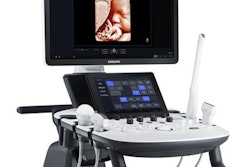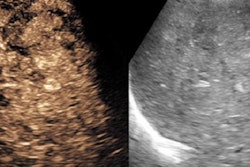Dear AuntMinnie Member,
The U.S. Preventive Services Task Force (USPSTF) today issued a final rule rejecting the screening of asymptomatic patients for thyroid cancer using palpation or ultrasound.
The decision comes as no surprise, given that the announcement largely hews to a draft recommendation the group issued in November. The USPSTF stated that there isn't much benefit to detecting low-risk thyroid cancer before patients are symptomatic. It found that screening carried with it the risk of overdiagnosis by finding tumors that might never pose a risk to individuals in their lifetimes -- a commonplace occurrence given the slow-growing nature of most thyroid cancers.
However, a related paper noted that the recent increase in thyroid cancer incidence may not be solely due to overdiagnosis. Learn more by clicking here, or visit our Ultrasound Community at ultrasound.auntminnie.com.
AI start-up makes debut
It seems like new developers of artificial intelligence (AI) software for medical applications are coming out of the woodwork. We're pleased to bring you the story of the latest AI start-up, Infervision, in our Artificial Intelligence Community.
Infervision was formed by entrepreneurs from China to address a worsening problem in the country: the lack of qualified radiologists to interpret chest x-rays and CT scans. The company has developed a deep-learning algorithm to assist with reading the studies, which it debuted on Monday at the GPU Technology Conference in San Jose, CA, sponsored by graphics hardware manufacturer NVIDIA.
The minds behind Infervision's technology see it as fundamentally different from computer-aided detection, which they believe hasn't lived up to expectations. Find out why by clicking here, or visit the Artificial Intelligence Community at ai.auntminnie.com.
Advances in nuclear cardiology
Meanwhile, you'll find a pair of articles on recent advances in nuclear cardiology in our Molecular Imaging Community.
First, researchers from the Netherlands found that using a gamma camera with solid-state digital detectors made from cadmium zinc telluride (CZT) improved their ability to predict the prognosis of patients examined with myocardial perfusion imaging studies. That story is available by clicking here.
Next up is an article about how a nuclear cardiology lab in Missouri was able to cut radiation dose delivered to its patients by modifying its scanning protocols, among other steps. Learn more by clicking here, or visit the Molecular Imaging Community at molecular.auntminnie.com.



















